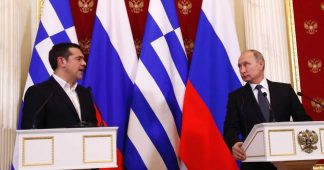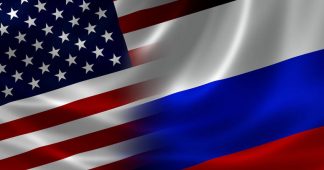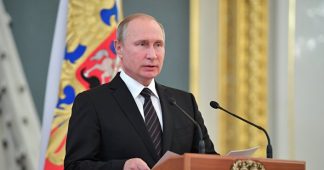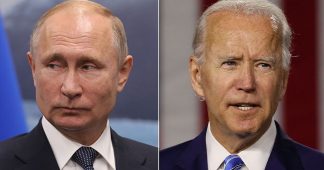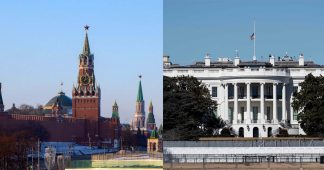Posted on
Aside from establishing face-to-face contact between the the two presidents, the Biden-Putin summit today met only the most modest expectations of those hoping for improved ties between the U.S. and Russia. By the same token, weapons makers and others profiteering on tension with Russia, and living in fear of a thaw in bilateral relations, can now breathe a sigh of relief.
Presidential spokesman Dmitry Peskov’s appearance on Russian TV early this morning, at which he dampened expectations, turned out to be a harbinger of things to come later in the day. Peskov said, “Clear signals had been sent to Moscow that the US would try to “restrain and pressure” Russia, adding that the constant talk about punishing Moscow “does not make the overall atmosphere any easier.” Putin himself charged recently that US leaders “want to hold back our [Russia’s] development and they talk about this openly.” At his press conference after the talks, Putin also charged that US attempts to “contain” Russia remained a huge fly in the ointment.
Baby Steps Forward …
Diplomats: Putin announced that the Russian and US ambassadors would be returning to their posts to work on what he called “an enormous backlog.”
Strategic arms: The Russian president reported an agreement to start interdepartmental consultations under the aegis of the Department of State and the Russian Foreign Ministry.
Cyber security: Putin said the two sides “have agreed, in principal, to sit down at the expert level and start working” on this issue, which he called “extremely important.”
Ukraine: Putin: “This issue was touched upon. I cannot say that it was done in great detail, but as far as I understood President Biden, he agreed that the Minsk agreements should be the basis for a settlement in southeastern Ukraine.
Tone: Putin described the conversation as “quite constructive,” with “no hostility at all.”
What was clearly absent was mutual trust. The key issue of trust came up at both press conferences. What was clear is that, in contrast to more productive summits in the past, even a modicum of trust was lacking. Mistrust has been the byword since the Western-sponsored coup in Ukraine (which Putin was particularly acerbic in denouncing today). That coup on Moscow’s doorstep and the coup regime’s expressed wish to join NATO prompted Russia to annex Crimea which hosts Russia’s only year-round naval base at Sevastopol. The coup and subsequent annexation shattered trust all around and account for the nadir reached in Russia-U.S. relations today.
… Now Big Steps Backward
In early September 2013 during one-on-one talks in St. Petersburg, President Putin gave President Barack Obama a way out of the dilemma he faced when all his advisers were insisting he wage open war on Syria, the casus belli being a chemical attack near Damascus blamed (falsely) on Syrian President Bashar al-Assad. The Russians succeeded in persuading Assad to agree to give over what chemical weapons he had for destruction under UN supervision on a US ship outfitted for such destruction. (Obama later bragged publicly about being able to face down “The Washington Playbook” of all his advisers and take advantage of the work Putin had already done with the Syrians.)
Putin had high hopes that mutual trust had been established before it fell victim to the coup in Kiev, accurately described as “the most blatant coup in history,” it having been revealed on YouTube two and a half weeks before.
Putin’s hopes did not seem unrealistic in the fall 2013. He actually set them down at the end of a New York Times op-ed on Sept. 11, 2013:
If we can avoid force against Syria, this will improve the atmosphere … and strengthen mutual trust. It will be our shared success and open the door to cooperation on other critical issues. My working and personal relationship with President Obama is marked by growing trust. I appreciate this. I carefully studied his address to the nation on Tuesday. And I would rather disagree with a case he made on American exceptionalism, stating that the United States’ policy is “what makes America different. It’s what makes us exceptional.”
It seems altogether possible that Biden and Secretary of State Antony Blinken came on like gangbusters, asserting “US exceptionalism” during the private two-on-two talks – in a way similar to the odd “diplomacy” with which Blinken approached the Chinese in Anchorage on March 18.
Verify, But Trust???
Putin’s body language at the outset of his press conference suggested, to me at least, that he had just had a fresh encounter with interlocutors who insisted that Russia change its behavior in certain specified areas before there could be real progress on important issues like strategic arms and cyber. Such an approach, of course, stands “Trust, But Verify” on its head.
President Ronald Reagan was not the first to insist on the latter, sensible approach.
I was involved personally in the preparation for the first Strategic Arms Limitation Talks and was in Moscow for the signing of the SALT 1 Treaty that provided the cornerstone of strategic stability for three decades until, under President George W. Bush the US left the treaty. The questions we intelligence officers regularly heard from President Richard Nixon and Henry Kissinger was, Can you verify this. How soon could you tell us if the Russians cheat? We are in a position to trust, IF you can verify.
Few remember that a decade later the Russians did cheat; we discovered it promptly and President Ronald Reagan called them on it. In the summer of 1983 we detected a huge early warning radar installation at Krasnoyarsk in Siberia. In 1984 Reagan declared it an outright violation of the Anti-Ballistic Missile Treaty. In the fall of 1989, Moscow agreed to eliminate the radar at Krasnoyarsk without preconditions. This is just one example of how patient, persistent diplomacy, such violations can be rectified. And that, of course, is what Trust But Verify was/is all about.
I also had a catbird seat during the first Reagan administration, watching Secretary of State George Shultz as he carefully built trust first with the President and then with Russian leader Mikhail Gorbachev. Many a Russophobe was in high position then, as now. At times I did not think Shultz could prevail over hardliners like CIA Director William Casey and Defense Secretary Casper Weinberger. But he did. Before he died, Shultz wrote about the importance of trust:
Now in my hundredth year, I offer my thoughts about what I have come to believe is as crucial an element in public life as it is in private life. I am thinking about trust. We all instinctively, or from personal experience, know that good neighborly relations thrive when neighbors trust one another, and that life can become miserable if trust is replaced with suspicion and doubt. Trust is perhaps a more complex factor in life between communities and nations, but it is just as critical in determining whether cooperation or conflict – or even war or peace – will dominate the relationship.
In my view it is largely a lack of trust that accounts for the meager results of today’s summit. Mistrust on the US side is fed by a host of charges against Russia – many of them phony – and the demonization of Putin. At his press conference, President Joe Biden at times seemed woefully misinformed about recent Russian history. It struck me that he has assimilated the drivel one find in the New York Times about Russia.
So who prevailed today? Cui bono, one must ask. As suggested above, the Military-Industrial-Congressional-Intelligence-Media-Academia-Think-Tank complex (MICIMATT), never more powerful, sleeps soundly tonight.
* Ray McGovern works with Tell the Word, a publishing arm of the ecumenical Church of the Saviour in inner-city Washington. His 27-year career as a CIA analyst includes serving as Chief of the Soviet Foreign Policy Branch and preparer/briefer of the President’s Daily Brief. He is co-founder of Veteran Intelligence Professionals for Sanity (VIPS).
Published at original.antiwar.com
